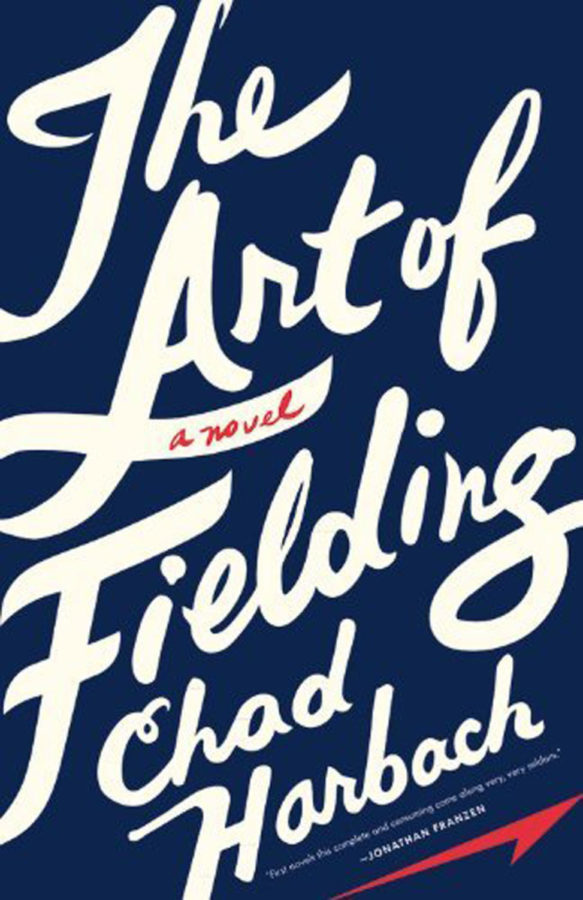The title of The Art of Fielding, Chad Harbach’s debut novel, refers to a book by the shortstop Aparicio Rodriguez. This fictional volume of baseball aphorisms is indispensable to Henry Skrimshander, the novel’s protagonist and a gifted shortstop. Henry turns to The Art of Fielding constantly for its concision, its elegance, and its depth of knowledge about the game. He’s read it so often that the aphorisms often float to the surface of his thoughts; he turns to the book more for comfort than for content.
You will find yourself in a position similar to Henry’s, only the book will be the novel itself, The Art of Fielding, and the matter at hand will be the twists and turns of life, not nine innings of a baseball game. You will be knocked out of the park, so to speak, by Harbach’s easy command of language. Like Henry, once you close the back cover of The Art of Fielding, you’ll turn back to dog-eared pages for scores of wise one-liners. An example: “But people didn’t forgive you for doing what felt right—that was the last thing they forgave you for.”
With The Art of Fielding, Harbach has created a literary oasis, complete with an absorbing but well-paced plot, characters of scope, replete with the glow of human error, and lessons about the search for a life within the self, a satisfying experience on a college campus, and a home in the Midwest. To boot, there is the book’s pleasing weight and design—you want to fall asleep with it tented on your belly, an empty mug next to your elbow.
The novel begins when Mike Schwartz, a Chicago native and rising sophomore on the baseball team at Westish College in Wisconsin, discovers Henry Skrimshander’s talent for baseball. When he learns that Henry isn’t planning on playing for a college team, Schwartz sets about bringing him to Westish, whose baseball team, the Harpooners, hasn’t won a conference championship in years. Schwartz’s determination in shaping Henry’s future (he trains him every day for several years) and driving the team to eventual glory is almost mythic in scale. When Schwartz is rejected from law school, though, his self-doubt surfaces. “The only thing he knew how to do was motivate other people… Manipulation, playing with dolls. What wouldn’t he give to have a talent of his own, talent like Henry’s? Nothing. He’d give it all.”
Henry, meanwhile, can’t believe his good fortune at being transported to the fantasy land of Westish, since all he’s ever wanted to do is play baseball. Rather quickly, though, he becomes disenchanted with certain aspects of the life of a college student, a sentiment many first-years are bound to sympathize with. As it turns out, Schwartz’s devotion to Henry winds up being as toxic for Henry as it is for Schwartz himself: “Every day was just that: a day, a blank, a nothing, in which you had to invent yourself and your friendship from scratch. The weight of everything you’d ever done was nothing.” Henry’s search for a sense of self that goes beyond the baseball diamond is as moving an account of a modernist hero as any in recent memory, especially since he is a peer, age-wise.
The stories of Guert Affenlight, the president of Westish, his daughter, Pella, and Henry’s biracial, pot-smoking roommate, Owen, with whom Affenlight becomes romantically involved, are woven through the trials of Henry and Mike with apparent ease. Also seamlessly told is the arc of the Harpooners’ rise to greatness as a team. It’s a delightful sports narrative in that it’s compelling without stifling the reader with deadly chunks of play-by-play—it never makes itself a burden to the plot or to the prose, which is a relief for a stressed someone trying to enjoy a novel.
Think of the simple, engaging prose as a balm for your Sosc-weary eyes. You’ll be sorry to leave a realm where college students seem to be dealing with real problems, instead of problem sets, like the rest of us. But you’ll return to those problem sets feeling a little wiser to the pocket of the world you live in.








